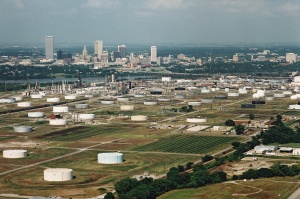Holly Tulsa Refinery

From Holly website, May 16, 2010
1700 S Union Ave
902 W 25th St
Tulsa, OK 74107
On June 1, 2009 Holly
Corporation acquired the 85,000 bpd Tulsa
Refinery and 3.2 million barrels of storage and
related logistics assets (on-site truck and rail
loading facilities) from Sunoco for $65 million.
Holly later sold in October 2009 associated
logistics assets to Holly Energy Partners and
Plains All American Pipeline for a combined
amount of $57.5 million. In December 2009 Holly
acquired the 75,000 bpd Sinclair Tulsa refinery
for $128.5 million with plans on integrating the
two Tulsa refineries. The combined facility is
planned to be operated at a capacity of 125,000
bpd. These two refineries are located
approximately 2 miles apart and will be
connected via pipeline. This refinery complex
sits in the Midwest region (PADD II),
approximately 45 miles from the supply and
storage hub at Cushing, Oklahoma, in a region
that is well served by crude pipelines that
deliver crude oil from Canada, U.S. onshore and
the Gulf Coast. This provides the Refinery the
flexibility to optimize its crude slate and
maintain lower crude inventories than a typical
refinery.
 This
refinery complex produces a combination of high
value lubricants and specialty products in
addition to distillates (diesel and jet fuel)
and gasoline fuels. Refined distillates and
gasolines are primarily delivered from the
refinery to market by two pipelines owned or
operated by Magellan Pipelines. The Magellan
pipeline terminal is located across from the
refinery and these Magellan pipelines connect
the refinery to distribution channels throughout
Texas, Oklahoma, Kansas, Missouri, Illinois,
Iowa, Minnesota and Wisconsin. Additionally,
on-site rail and truck rack capability
facilitates access to local refined product
markets.
This
refinery complex produces a combination of high
value lubricants and specialty products in
addition to distillates (diesel and jet fuel)
and gasoline fuels. Refined distillates and
gasolines are primarily delivered from the
refinery to market by two pipelines owned or
operated by Magellan Pipelines. The Magellan
pipeline terminal is located across from the
refinery and these Magellan pipelines connect
the refinery to distribution channels throughout
Texas, Oklahoma, Kansas, Missouri, Illinois,
Iowa, Minnesota and Wisconsin. Additionally,
on-site rail and truck rack capability
facilitates access to local refined product
markets.
The Tulsa Refinery primarily
processes sweet crude oils into high value light
products such as gasoline, diesel fuel, jet fuel
and lubricants, however has the capability to
process sour crude oils when economics dictate.
For 2009, gasoline, diesel fuel, jet fuel and
lubricants (excluding volumes purchased for
resale) represented 26%, 29%, 10% and 16%,
respectively, of the Tulsa Refinery's sales
volumes.
The Tulsa Refinery west
facility is located on a 750-acre site in Tulsa,
Oklahoma situated along the Arkansas River. The
principal process units at the Tulsa Refinery
west facility consist of crude distillation
(with light ends recovery), naphtha
hydrodesulfurization, catalytic reforming,
propane de-asphalting, lube extraction unit, MEK
dewaxing, delayed coker and butane splitter
units. The refinery's supporting infrastructure
includes approximately 3.2 million barrels of
feedstock and product tankage, of which 0.4
million barrels of tankage is owned by Plains,
and an additional 1.2 million barrels of tank
capacity that are currently out of service and
could be made available for future use.
The Tulsa Refinery east
facility is located on a 466-acre site also in
Tulsa, Oklahoma situated along the Arkansas
River. The principal process units at the Tulsa
Refinery east facility consist of crude
distillation, naphtha hydrodesulfurization, FCC,
isomerization, catalytic reforming, alkylation,
scanfiner, diesel hydrodesulfurization and
sulfur units. Additions and improvements to the
facility since late 2004 include a scanfining
unit to meet 2006 gasoline sulfur content
requirements, a new naphtha hydro desulphurizer
unit in 2005, a new sulfur plant, modifications
to the distillate hydro desulphurizer unit, a
new tail gas unit installed on the new sulfur
plant and the conversion of the reformer from a
17,000 BPD semi-regenerative reformer to a
22,000 BPD continuous catalyst regeneration
reformer (thereby increasing its capacity,
octane capability and yield of gasoline). The
refinery's supporting infrastructure includes
approximately 3.75 million barrels of tankage
capacity on the refinery's premises,
approximately 1.4 million barrels of which is
owned by HEP.
We are integrating the Tulsa
Refinery west and east facilities that will
result in a single, highly complex refinery
having an integrated crude processing rate of
approximately 125,000 BPSD, primarily by sending
intermediate streams from one facility to the
other for further processing. Pursuant to this
plan, high sulfur diesel and various gas oil
streams will be sent from the Tulsa Refinery
west facility to be processed in the diesel
hydrotreater and FCC units, respectively, at the
Tulsa Refinery east facility. Various heavy oil
streams will be sent from the Tulsa Refinery
east facility to be processed in our coker unit
at our Tulsa Refinery west facility. Various
other streams such as naphtha, hydrogen and fuel
gas will be shared between the two refinery
facilities.